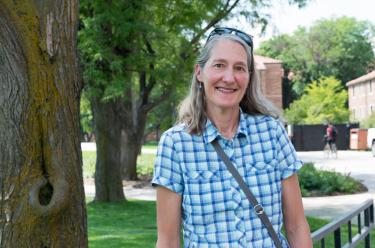CU Boulder’s SMART program helps underserved and underrepresented students in the STEM fields gain valuable research experience for graduate school.
What do parasites, broadband-internet cables, hydrogels and ultra-fast lasers have in common?
Rather than forming the basis of a crazy science experiment, these are all research topics showcased at this year's SMART (Summer Multicultural Access to Research Training) program symposium, which is scheduled for Thursday.
SMART is a summer-long initiative that provides students the opportunity to gain research experience across the science, technology, engineering and math (also called STEM) disciplines.

SMART students attend weekly Friday workshops where they learn various skills, including how to make a poster for their findings. Photo by Cay Leytham-Powell.
And the program, which is finishing its 28th year at CU Boulder, is only just getting started.
This year's class of 19 students represent schools ranging from California to Puerto Rico, and New Hampshire to New Mexico. They span the country—each arriving with big dreams and returning home with something even bigger: an educational focus and a mentor-relationship that helps propel their careers.
"In the sciences, in order to get into graduate school, having authentic research experience is critical," said Kristin Lopez, a SMART program administrator. "Part of what this program is trying to do is level the playing field and allow those research opportunities for students who may not have been able to get them for financial and other reasons."
"It opens a lot of doors," echoed Juan Pablo Gevaudan, a PhD student in civil, environmental and architectural engineering and one of the lead graduate advisors for the SMART program, "especially if a lot of doors were not originally open for you in the beginning."
Providing pathways to higher education is a fundamental value of SMART, which is part of both the Colorado Diversity Initiative and the broader Leadership Alliance, a consortium of 35 leading teaching and research institutions including many Ivy League and minority-serving colleges and universities, which mentor, train and introduce those with diverse backgrounds to the world of higher education.
"We view ourselves as part of a national effort," commented Barbara Kraus, an administrator of the SMART program. "It's not just about, 'We're going to get the students here,' 'We're going to recruit them to graduate school here.' It’s all part of the national effort."

Barbara Kraus is one of the SMART administrators, and ensures that student's experience is a great one. Photo by Cay Leytham-Powell.
Initially, SMART appears like any other undergraduate-research program in that qualified students are paired with faculty mentors, so that students then spend their summer conducting their own self-directed experiments and presenting their results when the program is over.
But that's where similarities end.
Over the course of 10 weeks, SMART takes in roughly 20 STEM students from around the country, places them in prominent CU Boulder laboratories, and provides them the necessary training, skills and experience to pursue graduate study.
They attend weekly workshops on everything from communicating their findings to taking the GRE, as well as designing, implementing and analyzing an experiment under the careful guidance of graduate students, lab postdocs and CU Boulder professors.
At the conclusion of the program, students present their findings orally at the Leadership Alliance National Symposium, and with a poster presentation at the annual SMART symposium.
"It's a powerful experience for them," said Kraus. "We've gotten to know faculty or program directors at other institutions, and they're always sending us students because they know that we'll take care of them."
In addition to providing that national conference experience, SMART is unique in a variety of fundamental ways, with one of the most important being the role of the graduate student mentors who spend their summer with the students, providing them guidance with everything they might need along the way.

One of the factors that sets SMART apart from other similar programs is the role that mentors play in the SMART student's experience. Photo by Cay Leytham-Powell.
"I like that there's a sense of community. There's mentors. There's people you can go to apart from just the people you do research with. In that sense, it makes this program unique and I’ve enjoyed that aspect," said Daniel Olivares, a 2017 SMART program participant and junior studying biology at Cal State University Monterey Bay.
Another aspect that sets this program apart is that it encourages students to not just work—it wants them to enjoy their time and truly learn what graduate student life is like.
"They really do a good job of balancing academia and training you, and challenging you, along with having fun and enjoying Colorado," commented Jonathan Nesper, a junior in physics from the University of Central Florida and one of this year's participants. "This is a fun place to come. I think it's one of those things where how much you put into it is how much you get out. I've had a great experience."
This sentiment is echoed among this year's participants, with most feeling prepared to go back to their home institutions and apply what they've learned this summer to their future endeavors.
"My experience has been extraordinary. I feel like I’ve gotten to stretch my skills better and I’ve gotten to know myself as a scientist better—where my weaknesses are and where I can improve and definitely improve my chances of getting into graduate school, improve my chances as a candidate," said Gloire Rubambiza, a 2017 SMART participant and senior in computer science from Grand Valley University. "It's been amazing just being a part of the program."
SMART's 2017 Student Symposium is Thursday, Aug. 10, from 10 a.m. to 12 p.m. in JILA X325 and X317, 440 UCB, Boulder, CO 80309.



